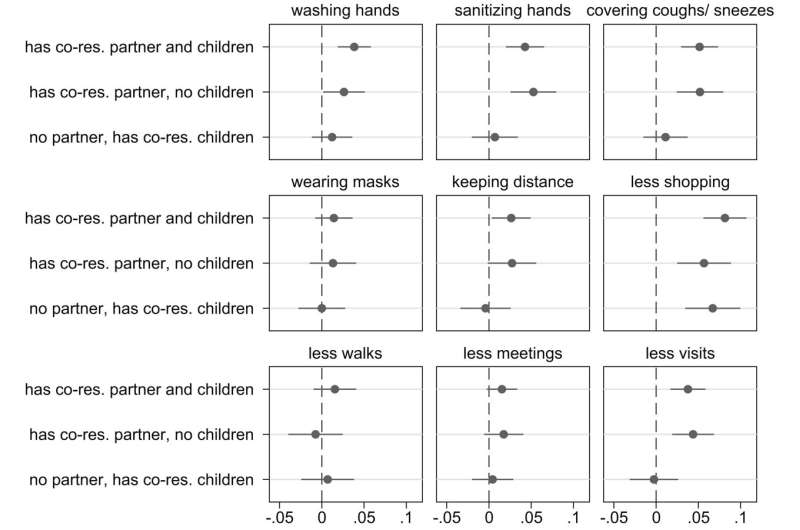This article has been reviewed according to Science X's editorial process and policies. Editors have highlighted the following attributes while ensuring the content's credibility:
fact-checked
peer-reviewed publication
trusted source
proofread
The key role of partners and children in pandemic prevention

Having a partner and, to a lesser extent, having children, leads people aged 50+ to take greater precautions against COVID-19, starting with the choice to get vaccinated. In a study published in PNAS, University of Florence social-statistician Bruno Arpino in collaboration with Valeria Bordone (University of Vienna) and Giorgio Di Gessa (University College London) found that social control and support within the family leads to the adoption of healthy behaviors.
The analyses were based on data from the Survey of Health, Aging and Retirement in Europe (SHARE), that conducted interviews on people aged 50 and over in 27 European countries between June and September 2020 and between June and August 2021. The survey asked respondents about their propensity to take precautions—such as washing hands, use sanitizing gel, cover coughs and sneezes, reduce going out to do the shopping—and to accept an anti-COVID vaccine.
"Our results show that having a partner is associated with higher probability of adopting precautionary behaviors and getting vaccinated among older people," explains Arpino. The findings are not influenced by whether or not older people are living with a partner or children, nor are they driven by particular age sub-groups, gender or country.
And, similarly to other pre-COVID-19 studies, they confirm that family social control and provision of support have positive effects on healthy behaviors. Di Gessa comments, "In the context of a pandemic, children were found to be particularly important for limiting older people's shopping in person and therefore the attendance of closed and crowded spaces where the risk of infection is greater."
"Although family contacts can be a source of contagion for COVID-19, our study shows that close family ties can also favor the adoption of preventive measures," adds Bordone. "Special attention should be paid to kinless (especially unpartnered) older individuals when designing interventions and recommendations to encourage the uptake and adherence to public health measures for COVID-19 prevention or in future pandemics."
The work is published in the journal Proceedings of the National Academy of Sciences.
More information: Bruno Arpino et al, COVID-19 precautionary behaviors and vaccine acceptance among older individuals: The role of close kin, Proceedings of the National Academy of Sciences (2023). DOI: 10.1073/pnas.2214382120




















